
Manfred Mann were an English rock band, formed in London and active between 1962 and 1969. The group were named after their keyboardist Manfred Mann, who later led the successful 1970s group Manfred Mann's Earth Band. The band had two different lead vocalists, Paul Jones from 1962 to 1966 and Mike d'Abo from 1966 to 1969.
Michael Graham Vickers is an English musician who came to prominence as the guitarist, flautist, and saxophonist with the 1960s band Manfred Mann.

Messin' is a rock album released in 1973 by Manfred Mann's Earth Band.
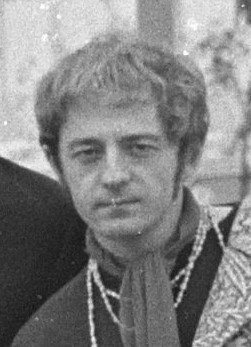
Michael John Hugg is a British musician who was a founding member of the 1960s group Manfred Mann.

Solar Fire is the fourth studio album by Manfred Mann's Earth Band, released in 1973. It spent 15 weeks on the Billboard 200 charts, peaking at number 96 on 11 May 1974. It was initially intended to be a full adaptation of The Planets Suite but Gustav Holst's heir, who had previously given permission to the adaptation of "Jupiter, the Bringer of Jollity" in the hit single "Joybringer", didn't allow this to happen, so the band made their own "cosmic" album using mostly original themes, although the most well known song is the Bob Dylan composition "Father of Day, Father of Night", which is in the Earth Band's live set to this day and remains a popular song on rock radio. "Pluto the Dog" and the two-part "Saturn, Lord of the Ring/Mercury, the Winged Messenger" are instrumentals, and "Earth the Circle Part 2" features only two lines of sung vocals. The album is often considered the peak of the early Earth Band line-up and, for a lot of progressive rock reviewers, the pinnacle of Mann's career in general.
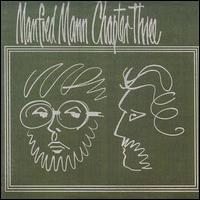
Manfred Mann Chapter Three is the debut album released in 1969 by Manfred Mann Chapter Three. It was one of the three first albums released on the Vertigo record label. The principal members of the group were Manfred Mann and Mike Hugg. Mann played the organ and acted as the group's musical arranger, whilst Hugg handled vocals, played piano and was the chief songwriter. The group was augmented by a five-piece brass section and several distinguished jazz soloists.
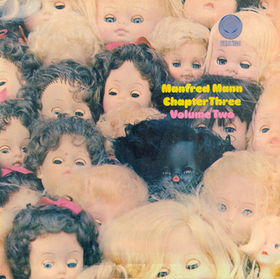
Manfred Mann Chapter Three Volume Two is the second and final album released by Manfred Mann Chapter Three. It was released in 1970 on Vertigo. Mann's next album, and most of his future albums, would be released under the name Manfred Mann's Earth Band.

Mighty Garvey! is the fifth and final studio album by Manfred Mann, released on 28 June 1968 by Fontana Records. It was the last recorded by the band after the change of direction and personnel of their 1966 album As Is. It continued a transition away from jazz and blues towards self-composed art-pop. Despite including two UK top 5 hit singles, the album did not chart and the band split up the year after. In the US and Canada, it was released as The Mighty Quinn by Mercury Records.
"5-4-3-2-1" is a 1964 song by British band Manfred Mann. It was written by Mann, Mike Hugg and Paul Jones, and peaked at #5 on the UK Singles Chart thanks to weekly television exposure from being the theme tune for the ITV pop music television programme Ready Steady Go!. This would be the last single released before bass player Dave Richmond left the band.
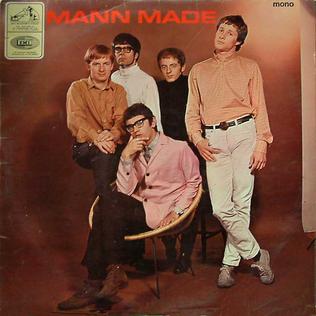
Mann Made is the second British and fourth American studio album by Manfred Mann, released in October 1965 on His Master's Voice in the United Kingdom, and November 1965 on Ascot Records in the United States. It was the group's final recording project with original members Mike Vickers and Paul Jones, as well as their last to be recorded at Abbey Road Studios, London, England, before switching to Fontana Records.

Instrumental Asylum is an EP by Manfred Mann, released in 1966. The EP is a 7-inch vinyl record and released in mono with the catalogue number His Master's Voice-EMI 7EG 8949.
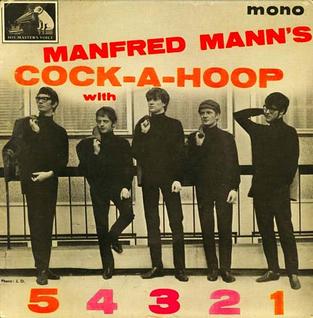
Manfred Mann's Cock-A-Hoop is an EP by Manfred Mann, released in 1964. The EP is a 7-inch vinyl record and released in mono with the catalogue number His Master's Voice-EMI 7EG 8848.

As Is is the third British studio album by Manfred Mann, released in the United Kingdom on 21 October 1966 through Fontana Records. It was their fourth overall but their first to feature new members Mike d'Abo and Klaus Voormann.

Soul of Mann is a 1967 compilation album of mostly instrumental recordings by Manfred Mann, released by HMV Records shortly after the company dropped the group from its roster. It was not well publicised and did not sell strongly.

Instrumental Assassination is a 1966 jazz-rock EP by Manfred Mann, produced by Shel Talmy and released by Fontana Records (TE17483). Mann reported that the group "loved it" and the producer was "particularly pleased": Fontana's Jack Baverstock found it full of ideas, humour and new thinking, but the EP sold poorly and was re-released in its entirety on the 1968 Fontana compilation album What A Mann.
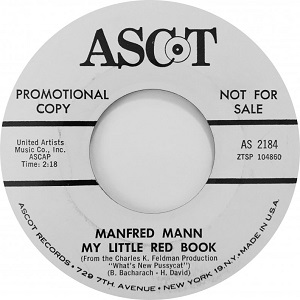
"My Little Red Book" (occasionally subtitled "(All I Do Is Talk About You)") is a song composed by American songwriter Burt Bacharach with lyrics by Hal David. The duo was enlisted by Charles K. Feldman to compose the music to Woody Allen's film What's New Pussycat? following a chance meeting between Feldman and Bacharach's fiancée Angie Dickinson in London. "My Little Red Book" was composed in three weeks together with several other songs intended for the movie. Musically, the song was initially composed in the key of C major, largely based on a reiterating piano riff performed. David's lyrics tells the tale of a distraught lover, who after getting dumped by his girlfriend browses through his "little red book" and taking out several girls to dance in a vain effort to get over her.

"Ha! Ha! Said the Clown" is a song written by Tony Hazzard, first recorded by British pop group Manfred Mann. Hazzard claims the song "came out of the blue" though he did not demo it for weeks. Following recording a demo, he approached manager Gerry Bron, who liked it enough to want one of his groups, Manfred Mann, to record it. Manfred Mann recorded their version of the single on 10 February 1967 at Philips Studio in Marble Arch, London, together with producer Shel Talmy. It was the second of three singles Manfred Mann recorded to feature the Mellotron.
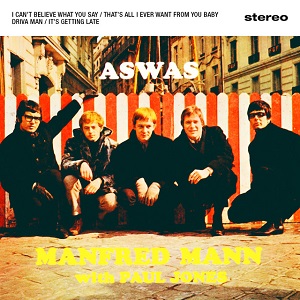
As Was is an EP by Manfred Mann, released in 1966. The EP is a 7-inch vinyl record and released in mono with the catalogue number His Master's Voice-EMI 7EG 8962.

The Five Faces of Manfred Mann is the debut British and second American studio album by Manfred Mann. It was first released in the United Kingdom on 11 September 1964 by His Master's Voice. In late October/early November, the album was released in Canada by Capitol Records. The Canadian track listing was almost the same as the UK version, except it included the hit "Do Wah Diddy Diddy" instead of "I've Got My Mojo Working". The record has been called "one of the great blues-based British invasion albums; it's a hot, rocking record that benefits from some virtuoso playing as well".
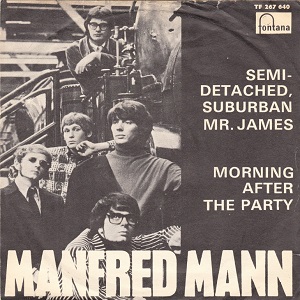
"Semi-Detached, Suburban Mr. James" is a song written by songwriters Geoff Stephens and John Carter, recorded by English pop group Manfred Mann in 1966. Previous to this, it was recorded by the band Herbie's People who were signed to CBS and had recorded other John Carter songs. The original title was ....Mr Jones and was recorded that way by Herbie's People. Their version was pulled by CBS when Manfred Mann said they'd record it. It was subsequently issued but only in the USA on the Okeh label. Stephens and Carter, who were writers for a publishing company on Denmark Street, London, wrote the song in a style different from their usual compositions, as love was not the prevalent theme. Introduced to the song by producer Shel Talmy, Manfred Mann recorded it at Philips Studio in August 1966. Released by Fontana Records on 21 October 1966, the song was backed by drummer Mike Hugg's composition "Morning After The Party" as the group's second single on the label. Keyboardist Manfred Mann plays the Mellotron on the recording; it was one of the earliest recordings featuring the instrument. Following a trend set by Bob Dylan, the song tackles the subject of life in British middle class suburbia from the perspective of a narrator, who laments the loss of a lover after her marriage to another man.


















